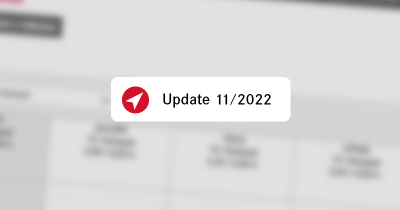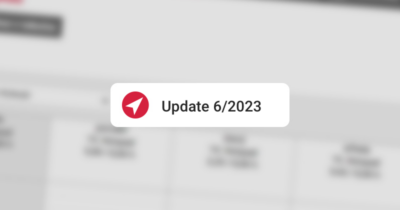Have you told your employees how much your Mercedes costs? Do they know what their colleagues are getting paid? Did they advise you who to give notice to? Welcome to the open company! With Petr Humlíček and Jaroslav Kuboš about managing a company in times of crisis and why open and emancipated companies have a better chance of survival.
More and more companies are now turning to the concept of the open company. You have successfully owned two of them for several years now, what do you mean by an open company?
PH.: Simply – it’s about the information and economic openness of the company’s management towards the employees, and this openness can then make the company very efficient and therefore increase profits. Although open companies are spoken of as something relatively new, in fact Bata was already an open company. For example, every employee and every department knew how much they earned. And even its employees were rewarded on a weekly basis. He didn’t want the workers to just listen, he tried to get them to start thinking like entrepreneurs – thinking about improvement, innovation, profit, taking responsibility for losses. This brings us to the basic features of an open company: employees have free access to information and know the economics of the company.
Can you describe it a little more?
JK: In a traditional company, it’s usually the case that there is some information, let’s think of it as a document. The document is classified, stored in a file cabinet in the boss’s office. And different employees working on a particular project need different pieces of this document to do their work. And so he goes to his boss, who knows the document, and gives everyone a piece. As a result, the document was almost entirely leaked anyway, but it also took an awful lot of time and work that was completely unnecessary. In an open company, people have free access to information, no one minds if an employee looks at the contract and finds out something more than what they need. The important thing is that he finds out for himself what he needs for his work, and the whole complicated process of asking around and finding out what and how is omitted.
PH.: And by far we don’t just mean contracts with clients. It’s also about having information about who is working on what job, how far along a particular project is, whether it looks good or bad, what else is going to be done with it, or perhaps who is currently overworked and, conversely, who is short of work.
Isn’t such openness of information dangerous in a company? Maybe with respect to the competition…
PH.: An open company doesn’t have a paranoid fear of someone finding out something they might not. That concern may be valid to some extent, but our experience is the opposite. Companies “skimp” on their know-how and think that they must not get to the competition. But in reality, your know-how is the employees who may be with that competitor two months from now. But look at Toyota, for example, which makes no secret of its know-how. On the contrary, they also train other companies. More important than the fear of openness to the outside world is the realization that you are giving out that information to your employees bit by bit anyway, because you can’t do it without it. And that doesn’t carry much more risk.
What about economic openness – can it really be beneficial to have employees see into your money?
PH: An open company isn’t afraid to show people in the company what the numbers are. When things are going well, they boast, when things are going badly, the employees know it too. Of course, you can open economic data at certain levels. From the payout table, to the margin on each job, to the owners’ profit. But it helps a lot if employees have an idea of how much it costs the company, how expensive their salary actually is. We try to make them a bit of an entrepreneur – if we sell something great and we’re supposed to keep fifty percent, we tell them. But at the same time we explain to them that there are minus orders that will eat up this margin. Employees value the company’s English course quite differently when they see how much it costs the company.
JK: In times of crisis, it’s very important when you have employees who understand that most businesses run on a margin of, say, ten percent. Then it is easier for them to realize that even a relatively small decrease in, for example, the volume of orders or productivity of work when they are at home in the home office can threaten the company. Or they will see that wage costs don’t just go away, they have to be paid even if the company doesn’t have a job. The moment people are given open information, there is a greater chance that they will be at least somewhat rational in negotiating their position. They will more easily accept, for example, that their pay should be cut.
How can all this help in a situation where, for example, an employer had to send the whole company to the home office?
PH: Simply – partly because the employees of an open company are used to working unsupervised. They don’t wait for the great “Mr. Divine” to say something and save the day. In an open company, people are able to work in a distributed way, they are used to it, because there is no “macho point” through which everything flows. Employees are able to work in smaller groups and only turn to the boss when they really don’t know what to do or when it’s a serious decision, so the home office is not a problem for them in this respect. If a firm is purely owner-managed, with a strong manager who may appear democratic but in reality runs the firm authoritatively, such a firm has a big disadvantage in times of crisis. Suddenly, her employees don’t know what to do, communication at the home office is difficult and their boss can’t return their calls or emails.
I believe it makes the job easier, but is this really enough? At a time when the economy of many companies has plummeted from one day to the next, isn’t it appropriate that a strong manager step in to take clear and radical steps for the company’s survival?
PH.: And isn’t it better if the employees themselves do them in the first place? At least in terms of what can be done by the staff? You see, we are not only promoting the concept of an open but also an emancipated company. This is a little bit of our variation on the free company as we know it from abroad, including giants like Google or IKEA. The essence of such a company is that the people in it are given both the trust and enough power to make decisions and move the company forward themselves. They are automatically accustomed to adapt and change their functioning in their own small way, and this will influence the development of the whole company. As a result, it is able to transform and streamline itself very quickly at all levels. You can’t do that so easily with a traditional firm.
JK: Another important feature of an emancipated company is that people here don’t just do what they have to do, they come up with innovations, ideas that could help the company. He’s figuring out how to find new customers, a new way to sell things and so on. It’s much harder to save a company where there’s a group of people sitting around waiting for you to get them out of trouble. And maybe they even feel that it’s your duty and woe betide you if it doesn’t work out.
But can’t the opposite also happen outside of a crisis: if I see how much my boss is taking in times of prosperity, what the company’s profits are, for example, isn’t it natural that I as an employee might feel unappreciated and push for a pay rise?
PH: I dare say from my experience that the reaction of most people is the opposite – when they see the real numbers, how much a company costs, what contracts it has made or made money on, then they are also much more aware of the hard reality of business. I’m not saying it’s like that for everyone, there are some people who never realize this and we wouldn’t move them if we explained it to them a hundred times. But my experience is that since we’ve had open companies, I haven’t had a single complaint about the amount of pay because someone thought the other person had more than them, for example. On the contrary, debates about the amount of salaries, which is usually a sensitive issue in Czech countries, have been reduced in our companies to the more favourable part, when people themselves come and give me good feedback on who I should give a raise to. Which is a great help for a manager.
It sounds quite idyllic – the employees know what to do, they treat the company as their own, one could almost say that the boss is not needed there…
PH.: The boss is needed, he can actually do more meaningful things than constantly rushing employees and reciting information over and over again.
JK.: Emancipated companies of course also have the bé – greater trust in employees also means that more responsibility is placed on them. They can decide many things for themselves, but they are also responsible for their decisions. And therein lies how employees are controlled. We don’t ask them if and how they do anything. We don’t find out when they took their holidays or how much they took. We simply want to know the result of the work and the cost at which they achieved that result. In an emancipated company, on the other hand, we can monitor efficiency very accurately without exhausting ourselves by constantly controlling and supervising every employee.
Is it possible to switch to this model of corporate functioning in times of crisis?
JK.: You know, in many companies this transition is already happening in a sense a bit unintentionally – because many people have had to switch to working from home and companies are forced to be a bit more open and trusting. Although, of course, this is not consciously building an open or emancipated company. But just the fact that people are separated from each other, they logically need more information and also have more freedom in their work. So there is a certain transformation going on there.
PH.: It is then up to the company what it will keep after returning to normal life, or what it will want to develop even more, consciously. A truly open company really does send a spreadsheet every month with all the costs and payroll of each individual, including how much the boss’s Mercedes costs. But you can’t do something like that during a coronavirus crisis, it would be like a bolt of lightning. The transition to an open and emancipated company can be gradual. The ideal situation is for example when personnel changes are made, work organisation changes, etc. In many ways, it can be painful and make bad blood even among employees. On the other hand – a coronavirus crisis can be a good opportunity to try this way of managing a company. Of course, it takes a lot of education and explanation, but from our point of view, the investment of effort is worth it. Opening and emancipating a company also means that you, as the owner or boss, are no longer carrying the stress of the company alone, but you have people around you who can help you and you can rely on them. And believe me, the more restful sleep is worth it.





